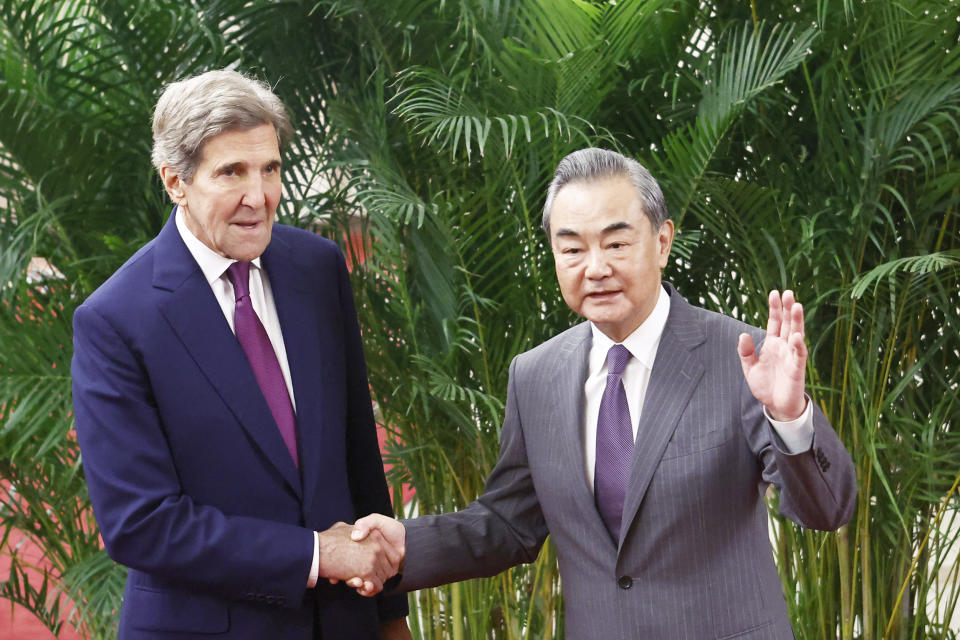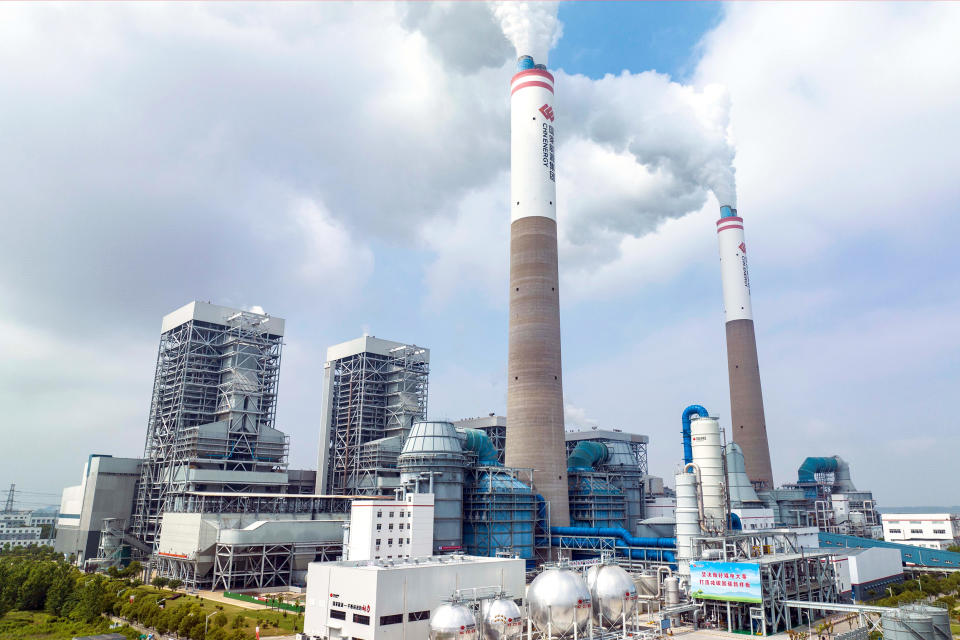As the world sizzles, U.S. and China try to restart vital climate talks
- Oops!Something went wrong.Please try again later.
HONG KONG — For all their differences, the U.S. and China have one thing in common: Both their populations are sweating through one of the hottest summers on record.
As U.S. climate envoy John Kerry arrived in Beijing for talks with Chinese officials earlier this week, temperatures reached a record of almost 126 degrees Fahrenheit in China’s arid northwest. Meanwhile, millions of people across the U.S. are experiencing a relentless heat wave, with more records expected to be broken this week.
The stakes could hardly be higher.
Experts say that the extreme weather being experienced all over the world is largely driven by climate change, and that there is no solution without the U.S. and China, the world’s two biggest greenhouse gas emitters. But relations between the two countries have been bogged down by disputes over trade, human rights and the status of Taiwan, freezing climate diplomacy in place for much of the past year.
That has implications for the whole world, said Li Shuo, a senior global policy adviser in Greenpeace East Asia’s Beijing office.
When the U.S. and China work together on climate change, it pushes other countries to make progress as well, he said Tuesday. But “when they cannot talk to each other, the global climate conversation becomes collateral damage.”
Kerry’s trip to China, his third as U.S. climate envoy, is the first formal top-level climate diplomacy between the two countries since China suspended talks last August after Nancy Pelosi, the House speaker at the time, visited Taiwan, a self-governing island that Beijing claims as its territory. Kerry is the third senior U.S. official to visit China in recent weeks as the world’s two largest economies try to improve ties.
Kerry said cooperation on climate change, once a bright spot in U.S.-China diplomacy, could set the relationship back on course.
“Climate, as you know, is a global issue, not a bilateral issue,” he said Tuesday as he met with China’s top diplomat, Wang Yi. “It’s a threat to all humankind.”
Wang said U.S.-China cooperation on climate change had “huge potential” but that it could not be separated from the “overall environment” of bilateral relations, according to a readout from the Chinese Foreign Ministry.

Their meeting Tuesday came as Beijing endured a record 27th day this year of temperatures above 95 F.
During his trip, Kerry focused on issues such as deforestation and reducing methane emissions. He praised China’s world-leading advances in renewable energy but said they had been undercut by its accelerating construction of coal-fired power plants. He also encouraged China to “enhance its climate ambition,” according to a State Department readout.
At a later digital media briefing Wednesday, Kerry said China had “produced more renewable energy, more solar and wind, than any other country in the world. They have deployed more of it than any — than the rest of the world put together. And they are pursuing a very aggressive renewable strategy to try to ultimately reduce their emissions.”
On the other side of the coin, he said, China has “built new coal plants because of the demands of their economy and the demand of their population and their absence of oil and gas, and yet we believe there are other alternatives. And we’re trying to work with China to figure out the path ahead.”
The U.S. aims to reach net-zero greenhouse gas emissions by 2050, while China has twin goals of reaching peak emissions by 2030 and achieving net-zero emissions by 2060.
Chinese President Xi Jinping, who did not meet with Kerry, told a national conference on environmental protection in Beijing on Tuesday that while China is still committed to those goals, how it achieves them “should and must be determined by ourselves, and will never be influenced by others,” according to the state-run broadcaster CCTV.
The major disagreement between the two countries is “how much each should and have done,” said Li Zhengyan, an assistant professor in the University of Hong Kong’s department of politics and public administration, who studies environmental policy.
The U.S. expects China to do more because it is the world’s largest emitter and has a robust economy, he said, while China argues it is still a developing country and that developed countries such as the U.S. should take greater responsibility in fighting climate change because of their “enormous historical emissions.”

If recent China trips by Secretary of State Antony Blinken and Treasury Secretary Janet Yellen were designed to explore whether the door was open for stabilizing ties, Kerry’s trip will test whether China is ready to walk through it, said Thom Woodroofe, senior fellow and founding director of the Asia Society Policy Institute’s China Climate Hub.
“This is the biggest opportunity we’ve got to really put some meat on the bone of the U.S.-China relationship,” said Woodroofe, a former climate diplomat.
The Biden administration’s highest hope for Kerry’s visit, he said, is that China will agree to wall off climate issues to keep the broader relationship from “spiraling out of control” in the event of a geopolitical flareup, like the Chinese spy balloon incident early this year that led Blinken to postpone his Beijing visit.
But that is unlikely to happen, Woodroofe said: “Geopolitics continues to be the tail that wags the climate policy dog in Beijing.”
Junjie Zhang, founder of the Environmental Research Center at Duke Kunshan University in China’s Jiangsu province, said the chances of climate cooperation being walled off in U.S.-China relations were “still relatively low,” citing U.S. legislation like the Inflation Reduction Act that favors American companies.
“It is unlikely that John Kerry will be able to change it,” he said.
Zhang encouraged both sides to take a more pragmatic approach, especially when it comes to technology that could help mitigate climate change.
“It will be very difficult to solve the issue of climate change if the U.S. holds a negative attitude towards everything related to China, especially considering China’s large production of lithium batteries, photovoltaic products," and electric vehicles, he said.
Kerry spent most of his three full days in Beijing with his counterpart, Xie Zhenhua, with whom he has a long relationship. But in a sign of China’s interest in re-engaging, he also met with more senior officials.
On Tuesday, Kerry met with Premier Li Qiang, the country’s No. 2 official, who also met with Yellen when she was in Beijing this month. He met with Vice President Han Zheng on Wednesday.
“I think it’s fair to say that Kerry’s been very warmly welcomed,” Woodroofe said.
Though no breakthroughs were expected this week, Kerry’s trip could lay the groundwork for more concrete outcomes at two major events toward the end of this year: a summit of Asia-Pacific leaders in San Francisco and the COP28 global climate talks in Dubai.
“The bottom line is there’s only one way to solve climate change,” Greenpeace’s Li Shuo said, “which is for the two biggest emitters in the world to at least be able to talk to each other.”
This article was originally published on NBCNews.com

